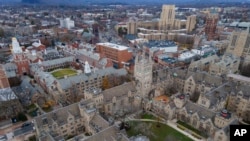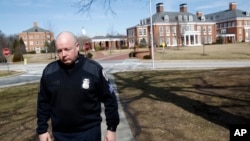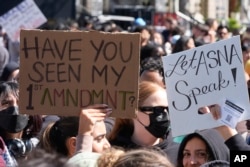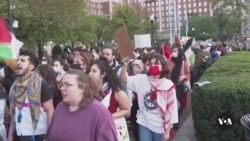Student Union
Manchester Arena Bomber Targeted Teens

The device that exploded as concert-goers started exiting Europe’s largest indoor arena was a ‘nail bomb’ that sent metal shards ripping into the bodies of the music fans.
Witnesses say the ground near the epicenter of the blast was covered with nuts and bolts. Medics on the scene reported as the horror unfolded that they were treating wounds consistent with shrapnel injury.
Soft targets
Nightclubs, restaurants, bars, vacation beaches and concerts have all been targeted in recent years by Islamic militants in the West, either directed or inspired by the Islamic State terror group, say analysts.
The targeting is partly a matter of convenience, according to counter-terror officials. Like transports hubs, concerts and nightclubs are not always tightly secure and draw large crowds, thereby maximizing the chances for attackers to inflict heavy loss of life as the bomber did on Monday night — and as militants did in November 2015 when they struck a sold-out rock concert at the Bataclan theater in the French capital, Paris, killing more than a hundred.
But jihadist strategists and propagandists also take cruel delight in striking at pop concerts, say analysts. IS propagandists made a point of stressing that the Bataclan concert by the Eagles of Death Metal band had been “precisely chosen” as a target by three suicide bombers because of its immoral nature.
“The targets included the Bataclan theater for exhibitions, where hundreds of pagans gathered for a concert of prostitution and vice," read a statement released by the terror group after the Paris attack.
Manchester Arena on Monday night presented an “ideal target” for jihadists, says Olivier Guitta, managing director at GlobalStrat, a security and geopolitical risk consulting firm, as it combined music, which is abhorred by the militants, a “U.S. singer, children and teenagers.”
He notes that in the past year-and-half music venues and clubs have been targeted four times by jihadist attackers — “Bataclan, the Pulse nightclub in Orlando, Florida, and the Reina nightclub, Istanbul and now the Manchester Arena.”
And there could have been more if Western security services had not prevented other attacks. In February 2016 a group of IS followers were arrested in France for planning terror attacks on nightclubs.
Attack on 'Crusaders'
There has been no official claim of responsibility for the Manchester attack from any terror group, including the Islamic State group, but IS supporters were quick after the carnage to celebrate the bombing on social media sites, saying it was as a victory over “the crusaders” of the West.
There were celebrations also on IS channels on Telegram, a social messaging app, prompting Michael S. Smith, a counter-terrorism analyst, to argue that that is a “strong indicator” the attack may be linked to the terror group. IS normally claims responsibility for attacks through their semi-official news channels, often not immediately but normally within 24 hours.
Concert halls were among a long list of targets recommended for attack in the latest issue of the IS magazine Rumiyah.
This is the worst terrorist attack in Britain in more than a decade. In July 7, 2005, four suicide bombers killed 52 people when they struck the London public transport system. After that incident the British government introduced measures to restrict the purchase of materials that can be used to make homemade explosives.
Britain’s interior minister Amber Rudd noted the particular barbarity of the bombing, “deliberately targeting some of the most vulnerable in our society — young people and children out at a pop concert.” She added: “My thoughts and prayers go out to the families and victims who have been affected.”
Oliver Jones, 17, who attended with his 19-year-old sister, told the Guardian newspaper: “The bang echoed around the foyer of the arena and people started to run.”
And Erin McDougle, aged 20, from Newcastle, said: “There was a loud bang at the end of the concert. The lights were already on so we knew it wasn’t part of the show. At first we thought it was a bomb. There was a lot of smoke. People started running out. When we got outside the arena there were dozens of police vans and quite a few ambulances.”
Jamie Dettmer compiled this report for VOA News.
See all News Updates of the Day
- By VOA News
Studying STEM? International students have funding options

US News & World Report takes a look at funding options for international students pursuing STEM degrees in the U.S.
The article explains the different kinds of scholarships and grants and offers tips on getting part-time jobs and private student loans. Read the full story here. (March 2024)
- By Robin Guess
US campuses are battlegrounds in free speech debate

This week the University of Southern California canceled the graduation speech of its senior class valedictorian at a time when there is a growing debate over the limits of free speech on American college campuses.
USC’s Asna Tabassum, a Muslim biomedical engineer major, was selected from among 100 outstanding students to address the graduating class of 2024 this May. However, the school withdrew the invitation for her to speak at the graduation ceremony citing safety concerns.
Tabassum denounced the decision, which she attributed to her public support for Palestinian human rights. She said it is part of “a campaign of hate meant to silence my voice.”
The school maintains it is a safety issue, not about free speech. School officials say they received an alarming number of violent threats after selecting her as speaker.
USC is one of many American universities that have struggled with policies over free speech and campus protest since October’s Hamas terrorist attack on Israel and the continuing fighting in Gaza. After weeks or months of on-campus protests and rallies, schools have been taking more forceful action to punish protesters who administrators say have become disruptive.
On Thursday at Columbia University in New York, police arrested more than 100 students who had gathered on campus for pro-Palestinian protests. The school’s dean wrote that the protesters had been told several times that they were violating university policies and would be suspended. The students say they were exercising their free speech rights.
At Washington’s American University, protests in all campus buildings have been banned by the school’s president since January. Under the new policy, students may not hold rallies, engage in silent protests or place posters in any campus building.
Protests and safety
University students have a long history of engaging in political activism. From the Vietnam War to abortion rights, universities have played a key role in American political debates.
However, students now say that schools like AU with a long-standing protest culture are silencing protesters with new rules.
Arusa Islam, American University student body president-elect and current vice president, says the policies are preventing an open discussion about U.S. foreign policy.
“Indoor protesting was never a problem, it was never an issue before October 7th,” Islam said. “Students were allowed to put up posters in buildings and students were allowed to have a silent protest.”
“And now we don’t have that right anymore,” she added. “We have been silenced and it is affecting us greatly.”
American University’s president, Sylvia Burwell, says the school’s new policies are intended to ensure that protests do not disrupt university activity.
Burwell also referred to recent events on campus that “made Jewish students feel unsafe and unwelcome.” She added, antisemitism is abhorrent, wrong, and will not be tolerated at American University.
While administrators insist that they are making narrow restrictions in the interests of providing an education, critics say the policies have a far-reaching effect.
At Cornell University, where new rules took effect in January, Claire Ting, the executive vice president of the Cornell Student Assembly, said the policies have had an unsettling effect on campus.
“The campus climate at Cornell has been tense surrounding free speech in recent times,” Ting emailed VOA.
Ting said that both students and faculty feel the policy has had chilling effects on free expression.
“Students report facing arbitrary, escalating punishment for violating the policy, with the policy itself lacking clear outlines for the consequences of civil disobedience,” she added.
In its new policy Cornell warns students that disciplinary action may be taken if protests impede people or traffic, damage school property or interfere with the school’s operations in any way.
In its campus-wide notice explaining the new guidelines, the school wrote that the new policy would ensure that expressive activity is allowed but must remain nonviolent.
The Foundation for Individual Rights in Education, also known as FIRE, has tracked free speech issues on American campuses.
FIRE and College Pulse have produced an annual survey, since 2022, ranking colleges based on their policies and what students say about the free speech climate on campus.
This year the group reported that “alarming” numbers of students say they self-censor or “find their administrations unclear” on free speech issues.
“College campuses have always been places where students have been unafraid to express themselves and with the recent Gaza conflict after the 10/7 attacks, it’s been very heated on both sides of this issue,” said Zach Greenberg, the senior program officer of FIRE.
Harvard ranked last in this year’s survey. FIRE said the school punished some professors and researchers over what they had said or written, and students reported a poor climate for free speech on campus.
The controversy came to Congress late last year, when Harvard’s president testified over complaints of widespread antisemitism.
“I don’t think you’d find many students on campus right now that would say we are the model for flourishing free speech and ideas exchange in the country,” said J. Sellers Hill, president of Harvard’s school newspaper The Harvard Crimson.
“But I think you’ve really seen that be acknowledged by administrators and it seems to be something they are dedicated to taking on.”
As the head of The Harvard Crimson, Hill manages the paper’s 350 editors and 90 reporters, who’ve covered, in detail, the ongoing free speech/protests controversy and the resignation of former President Claudine Gay following her testimony to Congress.
“I think no one would dispute Harvard has work to do and progress to make,” Hill said. “I think it’s a tough sell, for me, that Harvard is uniquely in its own league in terms of intolerance of speech. That doesn’t square with what I have seen on our college campus or on other college campuses around the country. I think Harvard is held to a higher standard.”
Proposed settlement offered over financial aid allegations

A group of U.S. colleges and universities have agreed to settle a lawsuit alleging deceptive financial aid tactics, according to a report published in The Hill.
The schools would pay $284 million to plaintiffs who were enrolled full-time and received financial aid between 2003 and 2024.
The schools have denied the allegations. (April 2024)
Universities in Middle East building research relationships with China

As China bolsters research relationships with universities in the Middle East, the United States has taken notice – especially when that research involves artificial intelligence.
Reporting for University World News, Yojana Sharma has the story. (March 2024)
Tips for staying safe while studying in the US

Recent news events have raised safety concerns among some international students studying in the United States.
Adarsh Khandelwal, writing in the India Times, has tips for staying safe from the moment you arrive until the day you complete your studies. (March 2024)










